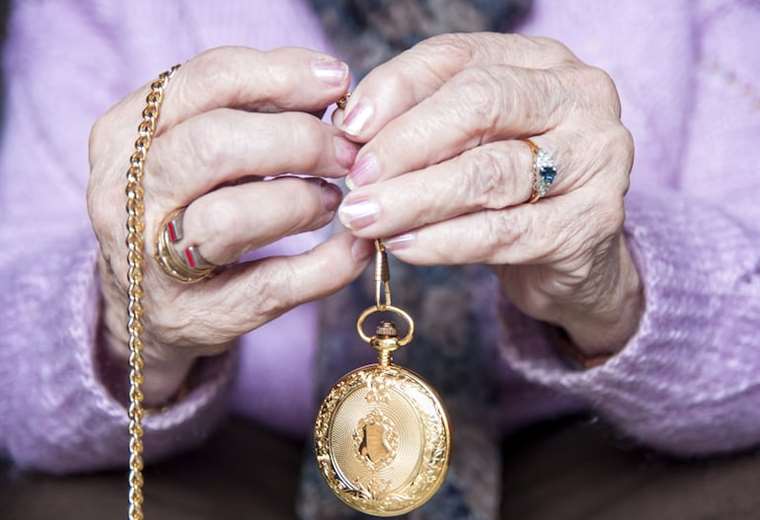June 17, 2024, 9:47 AM
June 17, 2024, 9:47 AM
It is noon in the busy commercial heart of Buenos Aires and not a single customer has yet entered the shoe store, however, in the neighboring gold buying businesses they are lining up to liquidate ‘grandmother’s jewelry’ as a last resort to face the crisis.
“Affections are left aside when you are covered by debts,” explains Mariana to AFP, who exchanged the watch that his grandfather had given to his father when he graduated for cash.
At 63 years old, her retirement as a judicial employee is not enough to cover basic expenses, eaten away by inflation of almost 300% year-on-year.
The money he received for the watch, a sum that he preferred not to reveal as well as his last name, will be used to cover “expense debts.” (housing expenses) and several arrears of prepaid (medicine).
Mariana’s story is that of hundreds who go every day to El Tasador, one of the main jewelry buying and selling houses in Buenos Aires, located in the heart of Buenos Aires where “I buy gold” signs abound.
In its art deco-style room, about ten clients wait to sell. “There have been a lot of people lately, I think because of what is happening in the country, people who perhaps had pieces that they were not planning to sell and decide to do so because they can’t make ends meet,” Natalia, one of the four appraisers, tells AFP. of the house.
In this place alone, about 300 operations are carried out daily, triple what they did until last year.
“Starting in January, the number of people coming to our salon began to increase. We have expanded capacity and hours because we can’t cope,” says Natalia, who withholds her last name “for safety.”
On television channels there are at least five appraisal shows sponsored by the main jewelry stores, part of the marketing of the sector where there is strong competition.
Empty mattress syndrome
As the economic adjustment emptied the pockets, The Argentines were liquidating ‘the dollars from the mattress‘, as popularly refers to the foreign currency savings that they hoard in their homes, a classic in this country accustomed to living with high inflation and distrustful of traditional banking.
Emptying the mattress, they turn to the jewelry box in the midst of a strong economic recession, plummeting consumption, thousands of layoffs and rate increases in essential services.
Daniel, a 56-year-old unemployed public accountant, enters several stores to appraise a silver keychain, but leaves disenchanted, they barely offer him what a subway ticket costs. “The situation is difficult, life in Argentina is very expensive,” he tells AFP.
“There is a constant flow of customers, all of them to sell, no one buys a ring,” says Carlos, the manager of a small jewelry store. “They bring anything in to be appraised, especially at the end of the month, when the bills arrive.” The most common thing is the sale of small gold pieces.
“The classic is the alliance (wedding ring), but they also bring Victorian jewelry, from the ‘belle époque’ that comes from grandparents and great-great-grandparents, unique pieces,” says Natalia, a gemologist and expert in the art of weighing carats.
Customers from all social classes come to his premises, next to the busy Once railway terminal.
In Argentina, and despite the fact that almost half of the population is poor, it is not uncommon for even humble families to treasure some gold jewelry.
“In the 1970s, people could access gold, anyone could have a ring, men wore gold cufflinks and tie bars, women were given gold watches when they turned 15, it was very accessible,” the appraiser notes. .
But the use of these pieces has long ceased to be common for safety reasons. This, added to the economic constraints, reinforces the will to sell.
“Gold has always been sold, what has changed is the purpose for which it is sold,” Natalia remarked. “Before it was to renovate a house, buy a car, have a party and today it is because ‘I can’t make ends meet’, ‘my services have increased’ or ‘I lost my job’.”

